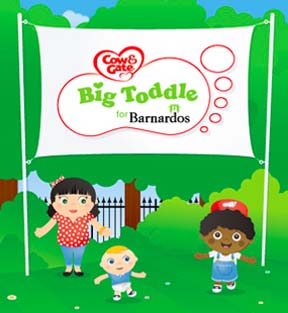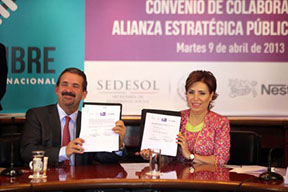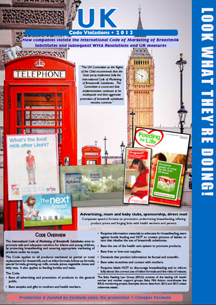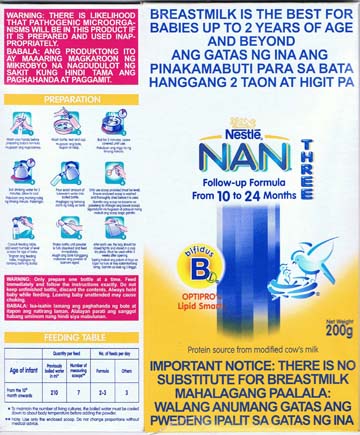Press releases
Danone steps up baby milk promotion in Ireland by branding Barnardos Ireland's Big Toddle events with Cow & Gate formula logo as it rations formula in UK
25 April, 2013 - 12:42 — WebmasterPress release 25 April 2013
Media coverage: Irish Independent 2 May
 Danone has branded its sponsorship of Barnardos Ireland's Big Toddle event running in 2013 with its Cow & Gate formula logo (left, image from the event Facebook page).
Danone has branded its sponsorship of Barnardos Ireland's Big Toddle event running in 2013 with its Cow & Gate formula logo (left, image from the event Facebook page).
At the same time, Danone is rationing its formula in the UK claiming it cannot meet demand, which has been denounced as a strategy to gain media coverage and circumvent restrictions on direct advertising of infant formula. Danone is facing a new competitive environment in both Ireland and the UK since December 2012 when Nestlé completed its takeover of Pfizer Nutrition and its Wyeth subsidiary, the company behind the SMA brand. Nestlé is already offering price discounts and targeting health workers with training events.
In what could be the first salvo of heightened competition in Ireland, Barnardos Ireland is working with Danone to encourage crèches, parents and childminders to organise Cow & Gate Big Toddle events, so promoting the formula brand direct to Danone's target groups. Baby Milk Action has written to Barnardos Ireland to remind it of internationally agreed marketing restrictions for formula brands and to enquire whether due diligence has been conducted in entering into this arrangement with Danone, which has already led to parents saying they will not take part in this year's events. It will update this page if a reply is received.
Nestle shareholder meeting 11 April 2013 - Chairman's Creative Storytelling Venture - Baby Milk Action launches exposé of misleading claims
11 April, 2013 - 16:23 — WebmasterBaby Milk Action press release 11 April 2013
Nestlé's 146th shareholder meeting was held in Lausanne, Switzerland, on 11 April 2013 and, in addition to complaining that "The political and regulatory environment for publicly listed companies is becoming more difficult in this country", Chairman Peter Brabeck-Letmathé launched his latest CSV report.
Conflicts of Interest threaten Mexico’s hunger project - the poison chalice
9 April, 2013 - 21:32 — PattiPRESS RELEASE
Conflicts of Interest threaten Mexico’s hunger project - industry's poison chalice
Gran Hotel, Mexico City 9th April 2013

Marcelo Melchior, President of Nestlé Mexico, and Rosario Robles, Secretary of Social Development signing the partnership deal, Mi Dulce Negocio Nestle (My Sweet Business) as part of Mexico's Crusade Against Hunger.
Danone v. Nestle formula marketing war reaches the UK
9 April, 2013 - 12:31 — WebmasterBaby Milk Action press release 9 April 2013
 Campaigners are pointing to new aggressive baby milk marketing practices in the UK as a sign of increased competition with Nestlé entering the UK market, where Danone is currently the largest company. Nestlé and Danone are respectively the world's biggest and second-biggest manufacturers of breastmilk substitutes. They have been engaged in an increasingly aggressive marketing war, particularly in Asia, since Danone purchased the NUMICO brands in 2007 (Nutricia, Milupa, Aptamil, Cow & Gate etc). Update 11 April 2013: UNICEF Lao monitoring report exposes aggressive marketing practices, principally Nestlé and Danone.
Campaigners are pointing to new aggressive baby milk marketing practices in the UK as a sign of increased competition with Nestlé entering the UK market, where Danone is currently the largest company. Nestlé and Danone are respectively the world's biggest and second-biggest manufacturers of breastmilk substitutes. They have been engaged in an increasingly aggressive marketing war, particularly in Asia, since Danone purchased the NUMICO brands in 2007 (Nutricia, Milupa, Aptamil, Cow & Gate etc). Update 11 April 2013: UNICEF Lao monitoring report exposes aggressive marketing practices, principally Nestlé and Danone.
This marketing war has now reached the UK following Nestlé's takeover of Pfizer Nutrition/Wyeth in 2012, manufacture of the SMA brand. Both Danone and Nestlé have launched new strategies to promote their products - the former gaining media coverage by claiming individuals in the UK are buying up formula to send to China thus causing a shortage in the UK, the latter taking advantage of any formula panic buying by putting its follow-on formula on prominent price promotion to increase sales. Nestlé has told the BBC: 'We do not have any evidence of bulk purchase of SMA for export.'
No appeal from Nestle in spying case
23 March, 2013 - 17:35 — WebmasterPress release - 23 March 2013
Nestlé indicated on 21 March that it will not be appealing against a Swiss court ruling in January that ordered it to pay damages and costs to members of Attac Switzerland after infiltrating the group with spies. Securitas, which ran the spies for Nestlé and was also ordered to pay damages and costs, has also indicated it will not be appealing.
In a statement Nestlé said that the staff involved are no longer working for Nestlé and the activities go against the company's principles, yet during the court case it defended the spying operation with the argument that the campaigners were legitimate targets for 'preventive observation' - see Baby Milk Action's 26 January press release. At the time of the first court hearing, Nestlé's legal director, Hans Peter Frick, even told RTS that Nestlé would do the same again if it thought it necessary (see: Affaire Attac: Nestlé pourrait récidiver - Attac Affair: Nestlé could return).
Mike Brady, Campaigns and Networking Coordinator, said:
"Just days after Nestlé released its Creating Shared Value summary report presenting itself as a responsible corporate citizen, here is yet more proof that this company abuses human rights. Spying on campaigners is shocking, but is not surprising given the unethical behaviour executives are responsible for around the world every single day. Nor is it surprising that caught out, Nestlé claims the behaviour is an aberration.
"Nestlé pushes its baby milk around the world claiming it 'protects' babies, when it knows that babies fed on formula are more likely to become sick than breastfeed babies and, in conditons of poverty, more likely to die. This practice is defended at the highest levels of the company. Right now Nestlé is attempting to replace legislation in the Philippines on the marketing of baby milks with its own weaker law. This is the reality, not the PR spin of Nestlé's Creating Shared Value reports.
"People need to look at what Nestlé actually does - not what it says it does - and hopefully the court's ruling and the fact that Nestlé knows it has no grounds for appeal will serve as a wake up call. Congratulations to the individuals at ATTAC Switzerland for pursuing this case. It takes courage to take on a company as powerful as Nestlé, particularly after it has demonstrated it will go to extreme lengths to try to defend its unethical practices."
Analysis of baby milk company responses to Save the Children's infant feeding report
21 February, 2013 - 20:38 — WebmasterJump to Baby Milk Action's analysis of responses from:
Save the Children launched a report called Superfood for babies: How overcoming barriers to breastfeeding will save children’s lives on 18 February 2013. It shared the report with the main baby food companies prior to publication and their responses has been published on the Save the Children site. Baby Milk Action takes a look at what their responses tell us and whether the company claims stand up to scrutiny. The response from the International Baby Food Action Network (IBFAN) with links to the report and petition campaign is available by clicking here.
IBFAN welcomes Save the Children campaign on infant and young child feeding
16 February, 2013 - 16:48 — WebmasterStatement 17 February 2013
(click here to download as pdf)
Click here for Save the Children's press release, report and petition campaign
Media coverage: Guardian (15 February), PDF 18 February: Daily Mail - Guardian - Daily Telegraph - Daily Mirror PDF, Guardian (19 February) Observer (24 February) PDF
 The International Baby Food Action Network (IBFAN) welcomes the renewed commitment to infant and young child feeding shown by Save the Children with the publication of its report "Superfood for Babies: How overcoming barriers to breastfeeding will save children’s lives" As partners for many decades, IBFAN looks forward to working together on our common objectives (quote from IBFAN given below).
The International Baby Food Action Network (IBFAN) welcomes the renewed commitment to infant and young child feeding shown by Save the Children with the publication of its report "Superfood for Babies: How overcoming barriers to breastfeeding will save children’s lives" As partners for many decades, IBFAN looks forward to working together on our common objectives (quote from IBFAN given below).
Breastfeeding is a public health imperative
"Breastfeeding is a public health imperative", so states the Declaration and Call to Action from IBFAN's World Breastfeeding Conference in New Delhi in December 2012, which was organised with the support of Save the Children, involving over 700 participants from 83 countries. The recommendations in the new Save the Children report reflect some of those in the call to action. IBFAN looks beyond the concept of breastmilk as “superfood”: the process of breastfeeding continues the development that began in the womb and babies who are not breastfed are more likely to suffer cognitive and developmental deficiencies and short- and long-term illness. As the declaration states:
"There is no food more nutritious, locally produced, affordable and sustainable than breastmilk. Artificial feeding increases the risk of not only childhood infections, but also of non-communicable diseases (NCDs) such as diabetes, obesity, cardiovascular disease and cancers, which are assuming epidemic proportions. But two out of three infants or 92 million infants of 136 million born - are either artificially or mixed fed. Breastfeeding has enormous benefits for maternal health, and is an important factor in child spacing for the millions of women who have no access to modern forms of contraception"
Regulating the baby food industry
IBFAN has worked with Save the Children through the UN system and directly with governments to encourage policy makers to take action to protect, promote and support breastfeeding. This led to the adoption of the International Code of Marketing of Breastmilk Substitutes in 1981 and to 15 subsequent, relevant Resolutions addressing changes in marketing practices and scientific knowledge.
Today over 60 countries have introduced legislation implementing most, or many but not all, of the provisions of the Code and Resolutions, always in the face of opposition by the baby food industry, which also attempts to weaken regulations already introduced.
In its report Save the Children is recommending that national laws should specify that health warnings should cover one-third of packaging of breastmilk substitutes.
Current regulations in the Philippines require this (left) - showing it can be done - but they are under attack by Nestlé.
Nestlé is leading an industry attempt to replace the Philippines regulations with its own weak law, which will mean (amongst other things) that the clear warnings will go. Instructions won't even have to be translated into Filipino. Members of Congress are under pressure to pass Nestlé's draft bill and have been told jobs will be lost and hundred of millions of pounds of investment cancelled if it is not passed.
Even now, Nestlé tries to undermine the warnings with logos and health claims suggesting benefits from using its formula.
You can sign a petition of solidarity with the Philippines on the AVAAZ site and send an email to Nestlé calling for it to stop its unethical behaviour.
Where Code-based measures have not been introduced or are not enforced, companies fail to meet their obligation to abide by the Code and Resolutions independently of government measures. Current concerns include companies targeting pregnant women and new mothers using “mother and baby clubs”, making health and nutrition claims for formula, sponsoring health workers and promoting brand names and artificial feeding using so-called Growing Up Milks, which are unnecessary. Accordingly, IBFAN is particularly supportive of the Save the Children call on the UN for a monitoring body independent of corporate interests:
to hold companies accountable at a global level, the UN should mandate WHO to create a body to monitor reports of Code violations or strengthen existing bodies such as IBFAN. That body should have the power to rule on Code violations and work with national regulatory bodies to issue penalties including fines based on the size of the violation and the size of the company’s turnover. The operating costs of this body could be covered by a combination of donor funding and the fines issued.
Health workers and conflicts of interest
As well as protecting the right of the mother/child dyad to breastfeed and ensuring mothers who use formula have accurate independent information, it is necessary to ensure mothers have support from health care systems, health workers and mother-support groups, who are not compromised by conflicts of interest. In too many countries, the health care system has become a means for companies to promote their products. Resolutions WHA 58.32 calls for action “to ensure that financial support and other incentives for programmes and health professionals working in infant and young child health do not create conflict of interest".
IBFAN is also a founder member of the Conflicts of Interest Coalition, which calls for health policy setting at national and international level to be protected from commercial influence.
Protection and support for working mothers
The recommendation in the report for protection and support for working mothers is welcome. The World Breastfeeding Conference declaration calls for action to: "Support all women with a comprehensive system of maternity protection at work, including the non-formal sector, with a provision of financing." IBFAN groups are actively working to encourage their governments to take action, using the minimum standards in ILO Maternity Protection Convention 183 as a starting point.
Implementing the Global Strategy for Infant and Young Child Feeding
As Save the Children has documented in its report, the action required to save millions of lives and prevent unnecessary suffering is already known. In 2012 policy makers adopted an implementation plan for the Global Strategy for Infant and Young Child Feeding first adopted in 2002 and need to deliver on this commitment. IBFAN's World Breastfeeding Trends initiative, a participatory action led by IBFAN, has generated score cards on progress for a growing number of countries (51 in the latest report), facilitating further action by governments and public-interest actors, to enable mothers to feed their babies optimally: exclusive breastfeeding for the first six months followed by nutritionally adequate and safe complementary foods while breastfeeding continues for up to two years of age or beyond.
Patti Rundall OBE, Co-Chair of IBFAN’s Global Council and Baby Milk Action Policy Director, said:
This important report from Save the Children should remind policy makers that protecting parents’ rights to independent information and supporting breastfeeding as the norm for feeding babies are public health imperatives. Instead of subsidising formula companies to boost exports or attract investment, allowing them to influence health and nutrition policies or involving them as partners in education initiatives, governments should ensure all inappropriate marketing is ended, and invest in policies to ensure mothers get the support they need to breastfeed and care for their babies. This will save our health care systems and national budgets a fortune and help the world to meet the Millennium Development Goals for reducing under-5 and maternal mortality. We know what needs to be done and have been making gradual progress - let us hope this report will help produce a quantum leap forward.
For further information contact:
Patti Rundall on 07786 523493 or prundall@babymilkaction.org or
Mike Brady on 07986 736179 or mikebrady@babymilkaction.org
- Login to post comments
GAIN –industry’s Trojan Horse fails to enter WHO’s policy setting process
31 January, 2013 - 16:22 — PattiGAIN –industry’s Trojan Horse fails to enter WHO’s policy setting process
WHO’s 132nd Executive Board, Geneva
29th January 2013
FOR PDF version CLICK HERE
For media coverage page down
The failure of GAIN (the Global Alliance for Improved Nutrition) to obtain official relations status with the World Health Organisation (WHO) as an NGO, has been warmly welcomed by health campaigners and the International Baby Food Action Network (IBFAN) the global network working to protect infant health. GAIN is a new type of public private entity which claims to works to tackle malnutrition - but its work seems to focus on opening up markets for its 600 partner companies (including Danone, the world’s second largest baby food company, Mars, Pepsi, and Coca Cola).
On the final day of deliberations of its 132nd meeting, in a briefly worded Resolution, WHO’s Executive Board (EB) called for answers regarding GAIN’s links with food corporations and its lobbying tactics. The EB decided to:
"… postpone consideration of the application for admission into official relations from The Global Alliance for Improved Nutrition to the Executive Board’s 134th session, and requested that the following information be provided to the Board through its Standing Committee on Nongovernmental Organizations: information concerning the nature and extent of the Alliance’s links with the global food industry, and the position of the Alliance with regard to its support and advocacy of WHO’s nutrition policies, including infant feeding and marketing of complementary foods."
The decision implies that IBFAN’s concerns about the lack of transparency in the application process, about GAIN’s true nature and purpose in the application process, and its attempts to undermine implementation of key WHA Resolutions on infant and young child feeding, were taken up by members of the Standing Committee on Non-governmental Organisations.
Conflicts of Interest were a key cross-cutting issue throughout the 8-day Executive Board meeting, where Member States tackled WHO’s Reform process and the future of the agency’s financing. Countless Member States called for more clarity on WHO’s conflicts of interest procedures and more caution in its relations with the Private Sector. While the Director General of WHO, Dr Margaret Chan, is now repeatedly stressing the importance of protecting WHO’s ‘norms and standards’ setting process, it remains to be seen if WHO will indeed adopt a coherent and effective policy that will protect itself and the international policy making process from undue influence of the private commercial sector.
In the debate on the Policy for 'Engagement with NGOs' Nils Daulaire, of the United States Department of Health and Human Services, called for wider engagement of "non-state actors – whether public interest or business oriented" and for all to be dealt with on an equal basis. However the US acknowledged the risks of undue influence, warning that ‘’briefcase NGOs’ working for others should not be given opportunities to take advantage of lax rules.’ Other countries, such as Ecuador called for corporations, who they consider to be ‘providers,’ to be consulted only when necessary.
The term ‘Briefcase NGO’ could apply to Public Private Partnership Partnerships (PPPs) or to entities like GAIN, that are often front organisations for businesses. but describe themselves in different ways, sometimes as PPPs and sometimes as Alliances. These bodies often have multiple purposes, and alongside their public health objectives, they assist commercial companies in the creation of markets for their products.
GAIN’s application for official relations status with WHO came just as WHO is to start work on the guidelines for the marketing of complementary foods – a key policy issue that GAIN is keen to influence. Indeed as the Standing Committee on NGOs Report showed and expressed concern, GAIN has already channelled funds to WHO for its micronutrient work. (6) One of GAIN's projects, funded by the Gates’ Foundation, aims to reach 500 million women and children with fortified foods. (7)
For more information:
Patti Rundall, Co-Chair, IBFAN/Baby Milk Action prundall@babymilkaction.org +44 7786 523493
Ina Verzivolli, Human Rights Officer, IBFAN/GIFA ina.verzivolli@gifa.org
Lida Lhotska, IBFAN Regional Coordinator, IBFAN/GIFA lida.lhotska@gifa.org
1 http://www.gainhealth.org/partnerships/business-alliance/members
Another group that has already gained official status is CropLife (a front organisation for Monsanto, Syngenta and other agro-companies promoting GM).
2 IBFAN is a 33-year old coalition of 273 not-for-profit non-governmental organizations in 168 developing and industrialized nations. www.ibfan.org
3 EB132R.9 http://apps.who.int/gb/ebwha/pdf_files/EB132/B132_R9-en.pdf
4 In October IBFAN learned that GAIN had been challenging the Kenya government about its proposed new law on the marketing of baby foods. In its lobby paper GAIN implied that proceeding with the law would threaten "Kenya's ability to meet its commitments as a Scaling Up Nutrition (SUN) country." Thankfully Kenya went ahead with the Law. At the Codex Alimentarius meetings GAIN consistently lobbies for companies to be allowed to use promotional claims – knowing that this could prevent Member States from banning such tactics. In December GAIN's lack of transparency was demonstrated in an exchange in the British Medical Journal, which challenged the ground-breaking baby food law in India that has been so critical in the protection of breastfeeding and child health. (http://info.babymilkaction.org/132ndEB2013)
5 WHO’s Standing Committee on NGOs (consisting of 5 countries: Armenia, Malaysia, Myanmar, Seychelles and Ecuador)met in a closed meeting on Tuesday, 22nd January and none of the application papers were publicly available. http://apps.who.int/gb/ebwha/pdf_files/EB132/B132_34-en.pdf
6 “The Committee noted that the Alliance provided some funding to WHO. In the view of the Committee, great care should be taken in considering relations with organizations that fund WHO.” Standing Committee on NGOs report.
7 http://www.gainhealth.org/performance/project-results
Press coverage :
Times of India Jan 30, 2013 PDF Global Alliance for Improved Nutrition's accreditation as NGO deferred by WHO, by Rema Nagarajan,
NEW DELHI: The World Health Organisation (WHO) has deferred the application of the Global Alliance for Improved Nutrition (GAIN) for official accreditation as an NGO seeking more information about its links with the global food industry.
Times of India: 1 February 2013 Is global alliance for improved nutrition an NGO? Rema Nagarajan
http://blogs.timesofindia.indiatimes.com/staying-alive/entry/gain-s-bid-to-enter-who-in-ngo-avatar-stymied
- Login to post comments
ATTAC Switzerland press release: Nestlegate: Successful civil lawsuit against NESTLE and SECURITAS
28 January, 2013 - 19:57 — WebmasterPress release issued by ATTAC Switzerland, 26 January 2013
(English translation provided by ATTAC Switzerland - click here for German version)
[Media coverage: Le Courrier 26 January - Background from Baby Milk Action]
ATTAC Switzerland has taken notice with great satisfaction of the civil court's president Jean-Luc Genillard's decision of 25 January 2013 in the case «Nestlegate». The Court has convicted NESTLE and SECURITAS AG of spying activities directed at ATTAC. It has recognized that these parties conducted illegal infiltrations. The claimants have been entitled to a financial compensation, since their personal rights have been violated. NESTLE and SECURITAS AG have been ordered to pay a financial compensation of 3,000 Swiss francs (3,238 US dollars) per claimant (a total of 27,000 Swiss francs = 29,145 US dollars = £18,570).







